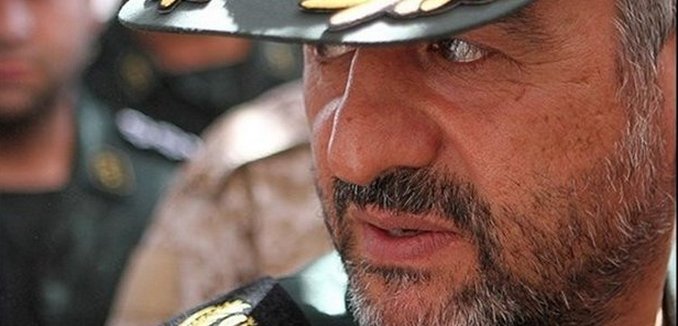A general of Iran’s Islamic Revolutionary Guard Corps (IRGC) said that Iran would keep its military forces in Syria, despite a warning from Israel earlier this week, Radio Free Europe/Radio Liberty reported Wednesday.
“The Islamic Republic of Iran will keep its military advisers, revolutionary forces, and its weapons in Syria,” Major General Mohammad Ali Jafari was quoted as saying by the Iranian press.
Jafari’s statement appeared to be in response to remarks from Israeli Prime Minister Benjamin Netanyahu, who said on Sunday, “We worked with impressive success to block Iran’s military entrenchment in Syria. In this framework, the IDF attacked Iranian and Hezbollah targets hundreds of times.”
Jafari referred to Netanyahu’s remarks as “a joke” and cautioned that Israel “was playing with [a] lion’s tail.”
More ominously, Jafari threatened, “Be afraid of the day that Iran’s precision-guided missiles roar and fall on your head and revenge all the blood you have spilt of innocent Muslims in the region.”
Jafari’s remarks appear to contradict claims made by Iranian Foreign Ministry Spokesman Bahram Qassemi, who recently denied that Iran had any combat troops in Syria, explaining, “The Syrian government invited us in order to advise them on methods to fight terrorism.”
Netanyahu’s comments on Sunday were part of his praise for outgoing IDF Chief of Staff Gadi Eisenkot.
Last week, New York Times columnist Bret Stephens interviewed Eisenkot, allowing to assess the effectiveness of the IDF in defending Israel against external threats during his tenure.
Eisenkot explained that in 2016 Iran had changed its strategy in Syria. Previously, Iran had concentrated on transferring weapons to its proxy Hezbollah. But in 2016, Iran openly adopted a policy of raising a Shi’ite army to wage war against Israel. Eisenkot estimated that the force initially consisted of over 20,000 troops made up of IRGC personnel, Hezbollah terrorists, and foreign Shiite fighters.
Israel, according to Eisenkot, has been able to counter the threat Iran poses in Syria because Israel has “complete intelligence superiority in this area. We enjoy complete aerial superiority. We have strong deterrence and we have the justification to act.”
Eisenkot also said that because Israel acted against missile factories that Iran built in Syria, Iran and its allies did not have a significant number of precision-guided missiles in their arsenal.
[Photo: Mehr News ]




